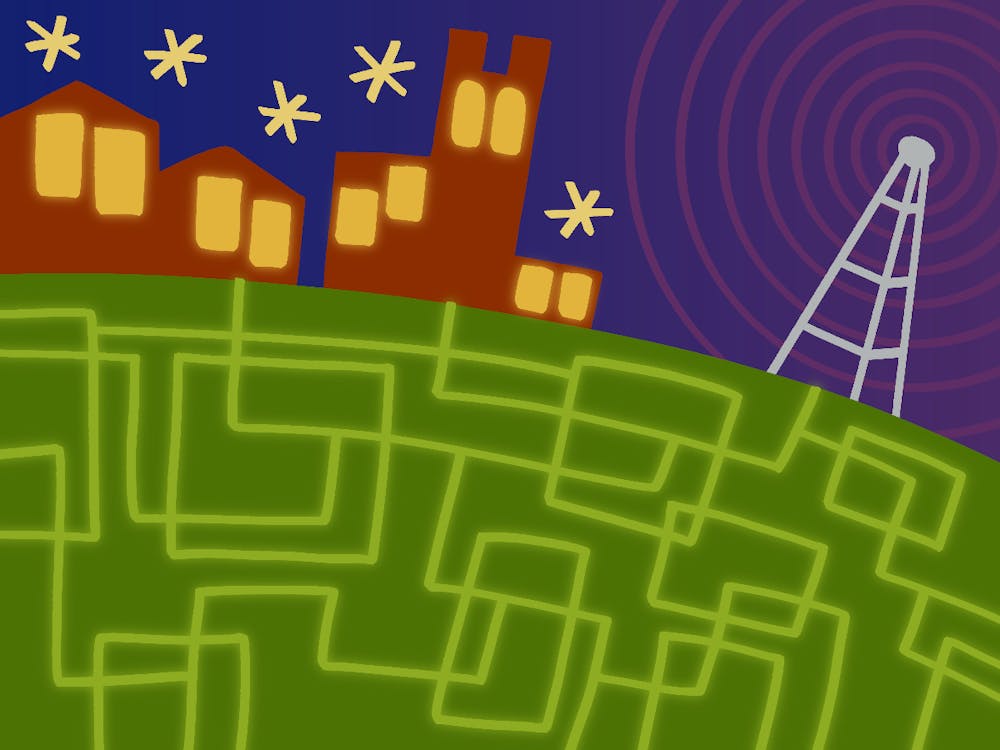Certain Alachua County residents will see improved internet service by 2030 thanks to a combination of federal, local and private funding toward broadband expansion.
The county was allocated $12.4 million through the federal government’s Broadband Equity Access and Deployment Program, or BEAD. The money will be used to expand high-speed internet in rural and underserved communities.
At the same time, Alachua County and Kinetic, a fiber internet provider, will enter a partnership to invest $22.9 million into expanding internet services. By the end of the project, 95% of the county should have access to high-speed internet.
“All of those together will bring internet, broadband internet, to everyone in the county,” said Ethan Long, a 35-year-old data analyst coordinator and the leader of the broadband initiative in Alachua County.
Over the next few years, Long said, Alachua County residents should expect to see big changes in their internet quality as more fiber technology is installed across the region. Businesses should also see an improvement in internet service, he added.
Under former President Joe Biden, over $42 billion was set to be distributed as part of BEAD, with over $1.1 billion slotted to Florida.
On May 8, President Donald Trump called the act “woke handouts based on race” via his Truth Social account and vowed to cut it to save American taxpayers billions of dollars.
So far, states have complied with the administration’s request. Only $21 billion, about half of the original amount, has been distributed nationwide for broadband deployment, still the largest such investment in U.S. history.
Nicole Crutchfield is a 39-year-old stay-at-home mom living in northeast Gainesville. Her house, along with 42 of her neighbors’ homes, will receive fiber optic internet through the grant program.
Crutchfield said her Wi-Fi has constant issues. When the internet goes out, her husband cannot contact clients of his roofing company, and her children cannot do their homework, she said.
“A lot of times it goes out for days at a time, especially if there’s a storm … we just constantly have problems with it,” she said.
Windstream is Crutchfield’s current internet provider. If Windstream accepts the federal money, it’ll spend $1,800, in addition to over $5,600 from the grant, to install fiber at her address.
Though Crutchfield tried to switch to a different service provider, she couldn’t get a clear signal and stayed with Windstream.
“They have a monopoly out here,” she said. “It sucks because we don’t have a choice.”
Crutchfield is not alone in her frustration. In 2021, the Gainesville Sun reported a lack of internet access impacted over 36,000 Alachua County residents, according to data from the Federal Communications Commission.
Eden Abraham is a 21-year-old UF marketing senior who lives at The Retreat, an apartment complex off 16th Avenue near UF campus.
She said it’s common to have to reconnect to the building’s Wi-Fi, and it routinely cuts out during school assignments, including timed quizzes, which are not submittable without internet connection.
“I try to give myself about five to 10 minutes if I have a meeting on Zoom or have an exam, just to connect to the Wi-Fi,” she said.
Abraham’s home, along with 38 others in The Retreat’s complex, are part of Alachua County’s allocation in the federal grant, according to the state. AT&T was selected to provide fiber optic service to those homes by 2030.
Contact Noah Lantor at nlantor@alligator.org. Follow him on X at @noah_lantor.

Noah is the Spring 2026 multimedia editor. He previously worked as the assistant multimedia editor for one semester and as a staff photographer for two semesters covering community stories and sports across Gainesville. Before his time at UF, Noah worked on the sidelines at Maryland and Penn State photographing their football teams. He has also done freelance and graduate photography work in his home state of Maryland. In his free time, he enjoys following hockey, football and traveling to rural places.






